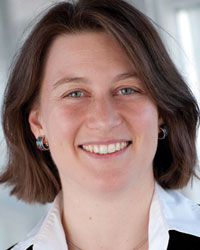2012 Janet Taylor Spence Award
Iris-Tatjana Kolassa
University of Ulm, Germany
 What is the focus of your award-winning research?
What is the focus of your award-winning research?
My research focuses on the consequences of traumatic stress on the mind, brain, and immune system down to the molecular level. Furthermore, I investigate the biomolecular pathways in terms of genetic risk factors that contribute to the development of a fear network in which memories of traumatic events are stored. It is hypothesized that entire subclusters of this fear network may be activated in response to — in themselves — harmless cues, which may explain unwanted memories (intrusions) in posttraumatic stress disorder (PTSD). A better understanding of the biomolecular pathways involved in the development of the fear network might help in the long run to develop more effective psychotherapeutic interventions supported by psychopharmacological drugs or might even help to prevent the development of PTSD after traumatic events. Finally, I investigate the reversibility of immunological and molecular alterations in traumatized patients through psychotherapy. To find answers to these questions, I intensively collaborate with partners from molecular biology, molecular toxicology, immunology, genetics, and molecular medicine.
How did you develop an interest in this area?
I have always had a particular interest in biology, chemistry, and medical questions outside of psychological science. I think that this interest informed my psychological research interests from early on and motivated me to constantly cross disciplinary boundaries.
Who are your mentors and/or biggest psychological influences?
There were many people who influenced me and who should be mentioned here. However, some need a special thank you, and this select group certainly includes Thomas Elbert from the University of Konstanz. He was a fantastic mentor and inspired my research in many ways. He also always had the right words. Other important mentors were Brigitte Rockstroh of the University of Konstanz and Dominique de Quervain of the University of Basel, but also institutions such as the Zukunftskolleg of the University of Konstanz — a rather stimulating place where excellent postdoctoral fellows from various fields of research work freely and independently as fellows and exchange ideas across disciplines. Furthermore, we had great support in realizing our ideas — my time in the Zukunftskolleg was tremendous!
What unique factors have contributed to your early success?
There are some personal factors: I am, through and through, and with all my heart, a researcher. Furthermore, I have a high energy level and a high level of endurance, and I always have a new research idea in mind. Finally, my own enthusiasm is contagious. Other factors were more institutional: The University of Konstanz founded the Zukunftskolleg in 2007, an interdisciplinary Institute for advanced studies for excellent young postdocs. I served as a member of the governing board in establishing the Zukunftskolleg. We were able to apply for monetary support for new interdisciplinary projects or scientific retreats, received coaching and support in combining motherhood (in my case, with twins) with leading a research group. The interdisciplinary spirit of the Zukunftskolleg and the possibilities given to me definitely shaped my research.
What does winning this award mean to you both personally and professionally?
I feel very honored by this distinction, and I am very happy that my research is appreciated not only on a national but also on an international level. My work would not have been possible without my collaborators and the Zukunftskolleg of the University of Konstanz. I view this award also as a recognition of their contribution and of the transformative and collaborative spirit of the Zukunftskolleg.

